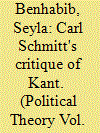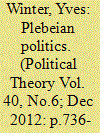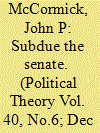| Srl | Item |
| 1 |
ID:
115733


|
|
|
|
|
| Publication |
2012.
|
| Summary/Abstract |
Carl Schmitt's critique of liberalism has gained increasing influence in the last few decades. This article focuses on Schmitt's analysis of international law in The Nomos of the Earth, in order to uncover the reasons for his appeal as a critic not only of liberalism but of American hegemonic aspirations as well. Schmitt saw the international legal order that developed after World War I, and particularly the "criminalization of aggressive war," as a smokescreen to hide U.S. aspirations to world dominance. By focusing on Schmitt's critique of Kant's concept of the "unjust enemy," the article shows the limits of Schmitt's views and concludes that Schmitt, as well as left critics of U.S. hegemony, misconstrue the relation between international law and democratic sovereignty as a model of top-down domination. As conflictual as the relationship between international norms and democratic sovereignty can be at times, this needs to be interpreted as one of mediation and not domination.
|
|
|
|
|
|
|
|
|
|
|
|
|
|
|
|
| 2 |
ID:
115735


|
|
|
|
|
| Publication |
2012.
|
| Summary/Abstract |
In his Florentine Histories, Machiavelli offers an ambivalent portrayal of the revolt of the textile workers in late fourteenth-century Florence, known as the tumult of the Ciompi. On the face of it, Machiavelli's depiction of the insurgent workers is not exactly flattering. Yet this picture is undermined by a firebrand speech, which Machiavelli invents and attributes to an unnamed leader of the plebeian revolt. I interpret this speech as a radical and egalitarian vector of thought opened up by Machiavelli's text. The revolutionary address reveals an untimely and not entirely self-conscious political radicalism, a plebeian politics that repudiates the logic of oligarchic privilege and is simultaneously not available for subsumption under the mantle of civic republicanism.
|
|
|
|
|
|
|
|
|
|
|
|
|
|
|
|
| 3 |
ID:
115734


|
|
|
|
|
| Publication |
2012.
|
| Summary/Abstract |
This article analyzes Machiavelli's accounts of the historical figures Agathocles, Clearchus, Appius and Pacuvius to (1) accentuate the Florentine's distinction between tyranny and civic leadership, (2) identify the proper place of elite punishment and popular empowerment in his conception of democratic politics, and (3) criticize contemporary Straussian and "radical" interpreters of Machiavelli for profoundly underestimating the roles that popular judgment and popular rule play within his political thought.
|
|
|
|
|
|
|
|
|
|
|
|
|
|
|
|